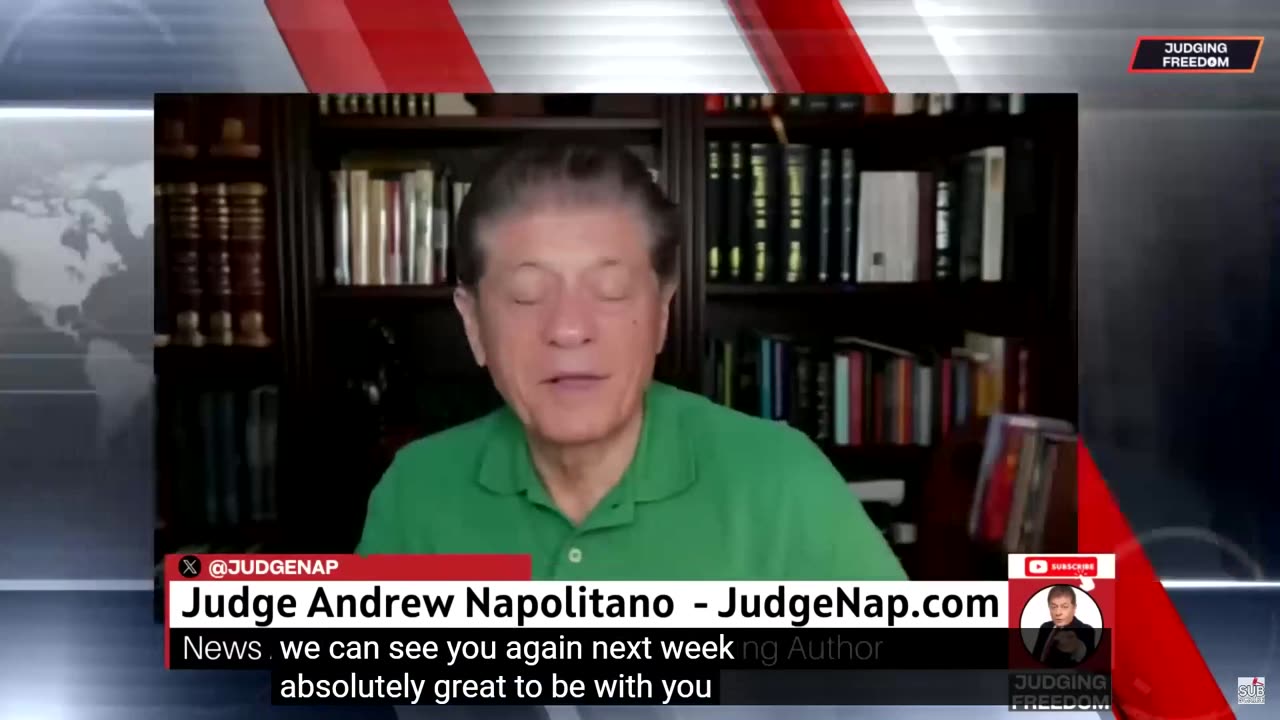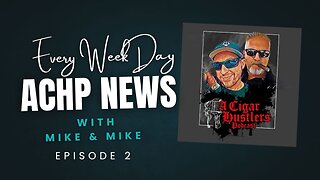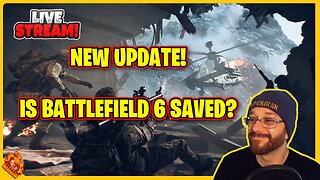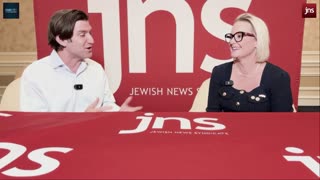Premium Only Content

Prof. Jeffrey Sachs : How to Save Ukraine from the US Judge Napolitano - Judging Freedom
https://www.youtube.com/watch?v=hDpPV1YLwMc
SPED UP, ENG SUBS
Hi everyone, Judge Andrew Napolitano here for Judging Freedom. Today is Monday, July 1st, 2024. Professor Jeffrey Sachs joins us today. Professor Sachs, a pleasure, my dear friend. Great to be with you. Thanks a lot. Thanks for taking the time to join us. Which country is the worst enemy for Ukraine, Russia or the United States? Well, I say the U.S. because the U.S. sweet-talked Ukraine into disaster. What I've recently written is that we told Ukrainian leaders lots of fairy tales about how they were going to join NATO and live happily ever after. And it was a great illusion that we sold to Ukraine, not for Ukraine's sake, by the way, but for the sake of U.S. aggressive foreign policy, what we call neoconservatism. The idea, the plan from the 1990s onward was that the U.S. would assert its unipolar, dominant, hegemonic, primacy position in the world, and would do so in part by extending the U.S. military to all regions of the world, including surrounding Russia, including possibly breaking up Russia. And Ukraine was a major part of that strategy, which dates back incidentally to 1992, to ideas of Richard Cheney, who in 1992 was the Defense Secretary, and of course who in 2001 became Vice President of the United States. Another part of this neoconservative plan was to overthrow governments that the United States did not like, and that included the wars of choice in Iraq, in Syria, in Libya, and a coup that the United States actively participated in in Ukraine in 2014. So we sold a fairy tale to Ukraine. The Ukrainian leaders bought it. I have to say, I've been telling them all along, though they didn't like to hear it from me, that's for sure, that we were on a path to make Ukraine the Afghanistan of Europe, as I frequently called it. By that, I meant a country devastated by a U.S.-provoked war of choice because the U.S. overreached what it can do at the great expense of another place on the planet. So this is the sense that I said that Ukraine exemplifies a often-quoted aphorism attributed to Henry Kissinger, attributed, by the way, by William Buckley from a conversation with Kissinger, in which Kissinger said, to be an enemy of the United States is dangerous, but to be a friend is fatal. This is probably the classic, even though they're both passed on, the classic example of that. I mean, you're familiar with the inch-and-a-half-thick agreement that Ukraine and Russia negotiated in Turkey in March of 2022, initialed by the Russian and Ukrainian negotiators, which would have prevented 10 million people from fleeing Ukraine and half a million Ukrainian soldiers from being killed or seriously wounded. Ukraine's infrastructure would still be intact. The Russians would have their comfort zone, and there would have been no NATO. Now, if that happens, it's going to happen after 10 million people have left, and after half a million people are dead or seriously wounded, and after the infrastructure is destroyed. It's exactly right what you're saying, of course, and it also reflects a certain attitude because those in charge in the United States will shrug their shoulders and say, well, we tried. They don't count the dead. They don't count the losses. They don't count the destruction. They're not held accountable for this. To make these points, one is accused of being a Putin apologist rather than actually knowing the history and knowing the facts because we're in the world of spin. So the world of spin says that what Russia did in February 24, 2022, that is its special military operation, was unprovoked, the word we've discussed many times. That's the spin. The fact of the matter is it was provoked, and it was entirely avoidable, and this is what is so tragic and what is still playing out. Now we see, and it's alarming, we actually do not have a president who can negotiate right now. I've been saying every day, negotiate. We saw in the debate, it actually probably literally could not happen right now. This is completely alarming. But we do have a secretary of state who has rejected his core responsibility in that job, which is to communicate with other high-ranking diplomats of other countries so as to minimize a war and minimize killing. Rather, they don't even talk. I mean, the secretary of defense spoke to the Russian foreign minister of defense after the killings on the beach in Sevastopol, I guess because the foreign minister of Russia warned the U.S. ambassador to Russia, tell your guys back in Washington, we are no longer at peace. This is, of course, something that is stunning to see. I had a personal experience in this. I was invited to speak to a group of foreign ministers online, and that included the Russian foreign minister, Sergey Lavrov. It included Antony Blinken, the U.S. secretary of state, and included other leaders. And when I joined online, at first, it became apparent to me that the G7 foreign ministers were literally not speaking one-to-one or directly, let me say, with Lavrov, even though they were in the same room. It was so contrived. It was like a junior high school clique, but we're not talking to them. He's on the other side. When was it, Professor? I don't want to get too specific, but it was during this period from 2022 onward. The war was raging, and there was an occasion where I was invited to speak. And it's amazing to me how grown-ups can act like children, and worse, because I'm often reminded children don't act so badly. But if you're in a room together and a war is going on, you talk with each other. You don't make it the point, precisely, we don't talk to the other side. This is what has been happening in this world in recent years. I put a huge responsibility for this on Blinken, because, as you said, this is his job. He should understand his job is to talk to, quote, the other side, even an adversary. He is our secretary of state. He is our chief diplomat. We can't end these conflicts other than through diplomacy. We are not ending this on the battlefield. All we're doing on the battlefield is ending lives. This has to be ended through diplomacy. And the idea, which is sometimes said, well, you can't talk to them. They're evil. They won't keep their word. There's no possibility of diplomacy. This is so factually wrong, it's unfortunate to say it's almost the opposite. If you ask between the U.S. and Russia, who has kept one's word and who has not, it is not Russia that is the one that repeatedly has violated its word. And so the idea about that side so evil that we can't even speak to it is not only wrong as a principle of how to search for peace, but it's factually wrong in terms of what has actually transpired. Because by my count, and I've been there at a lot of this in direct role and seen it, it was the United States that promised that NATO would not enlarge. That goes back to 1990. It was the United States that told Mikhail Gorbachev and told Boris Yeltsin, no, now we have a trusting mutual relationship. It was the United States intercepted in the phone call between the assistant secretary of state, Victoria Nuland, and the U.S. ambassador to Ukraine, Geoffrey Piot, in January 2014, that was plotting the post-Yanukovych government. How dare the United States plot the government of Ukraine on a phone call? By the way, it was intercepted by the Russians and posted online for all of us to hear. It was the United States that acceded, supported diplomatically in the U.N. Security Council the Minsk II agreement and then privately said to the Ukrainians, don't do it. You don't have to do it. It was the United States that rejected diplomacy at the end of 2021. It was the United States that intervened, as you said, to stop an agreement in March 2022. And then we say there's no one to talk to. You can't do diplomacy. They don't keep their word. By the way, on strategic issues, that is nuclear arms issues. It's the United States, not Russia, that unilaterally abandoned the anti-ballistic missile treaty in 2002. And it's the United States that unilaterally walked out of the intermediate nuclear force treaty in 2019. Oh, my God. I'm not saying the other side is perfect, but the idea that we're so pure, they're so evil that we don't even talk. This is absurdly opposite to the truth. You have painted a fascinating and terrifying picture. We're going to take a break for a commercial announcement. When we come back, I'm going to ask Professor Sachs if, notwithstanding all those things that the United States did to harm Ukraine, when we come back, if Ukrainian politicians still think the United States will save them after this. You all know that I'm a paid spokesperson for Lear Capital, but I'm also a customer, a very satisfied customer. About a year ago, I bought gold and it's now increased in value 23%. So $100 invested in gold a year ago is now worth $123. You have $100 in the bank. It still shows $100, but $100 in the bank is now worth 24% less. Inflation has reduced all of your savings, all of your buying power, and mine, by 24%. And gold is largely immune from that. If you want to learn how gold will soon hit $3,200 an ounce, call Lear Capital. 800-511-4620. Go to learchatsnap.com. Get your free gold report. Same experts who predicted the 23% rise that I've enjoyed have predicted this $3,200 an ounce gold. Learn about how to transfer this to an IRA. Protect your savings. 800-511-4620. Learchatsnap.com. Tell them the judge sent you. Before I put that question to you, just to raise your blood pressure a little, even though I love you, here's President Biden on Thursday night. Oh, by Professor Sachs. We're the envy of the world. We're the envy of the world. Name me a single major country president who would trade places with the United States of America. All our problems and all our opportunities. We're the most progressive country in the world in getting things done. We're the strongest country in the world. We're a country in the world that keeps our word, and everybody trusts us, all of our allies, and those who he calls up to from Kim Jong-il, he sends love letters to him, Putin, et cetera, they don't want to know what he's talking about. It's very sad. I am in Southeast Asia now, and I'm speaking to leaders around the world, and it's unfortunately not at all like President Biden seems to think. He does live in the rhetoric of the 1990s, which got us started in this neocon era. That was the rhetoric and arrogance of triumphalism. It was reflected in Richard Cheney's ideas in 1992 that helped set a new course of foreign policy based on what President Biden believes to this day, that we are the unrivaled, unipolar, sole superpower, indispensable nation of the world, and can do what we want, and no one can, quote, stop us. That is what has gotten us into so much trouble. It's the defining idea of neoconservatism, of which Biden has been a full-fledged member from the time that he was in the Senate, and then Vice President, and now President. But he lives in the past, I'm sorry to say. The world is not like he thinks it is. The world does not look up to the United States with trust. The world looks to the U.S. with great anxiety. The world looks at the debate that just occurred, and I know how many leaders around the world are shaking their heads, asking, what happened to the United States? So this is really the point. Do the Ukrainian politicians, whether it's President Putin, or the people around him, or the people in parliament, or the head of the military, whether it's still in some official capacity of power, because Zelensky is not, still think the United States is their friend, and still think after that, you ticked off before the commercial break, after the absurdity that you just analyzed what the President thinks, do the Ukrainian politicians still think the U.S. will bail them out? Look, some of the politicians like Zelensky are, you know, it's so personal, it's maybe even life or death for them as individuals, what they say. There's a very, very hard right neo-Nazi, paramilitary part of Ukraine that has been part of Ukraine's governance in recent years, and I've been told by senior people, well, Zelensky doesn't really have any choice. It's his life or death. I don't know whether that's true or not, but I would say that, of course, Ukraine right now is ruled by a very small clique. There is rampant corruption. There is bleeding out on the battlefield. Ukraine is losing across this long contact line, land, and often 1,000 to 2,000 people every single day right now, and Ukrainians that are in charge, this small number that are operating extra-constitutionally, this is a de facto government. It's not elected. It's passed its term. It has no constitutional basis. Well, I don't know what they're really hoping, but what is happening is, of course, that they are losing and losing badly, and the people of Ukraine have no choice. The people of Ukraine are not asked, they're not given a say at the ballot box or even in any public discourse, and what we do know is that people are trying to flee Ukraine. They're trying to cross the rivers into Eastern Europe from Ukraine. They're dying. They're being shot. They're being grabbed off the streets and sent to the front lines to die. We see horrendous videos. I get emails about this of the people who know neighbors or friends who are grabbed from their homes or off the street and sent to the front lines, so this is fighting to the last Ukrainian, as the awful expression goes, that the U.S. will fight to the last Ukrainian, the cynical but operational idea that the United States will continue to arm and finance this useless, losing cause because it's not American soldiers dying. It's terrible, but also we see we do not have a functional White House in the United States, so I don't know whether a functional president would do something different. We would hope so, but I'm extremely worried that we don't even have a functional president. If when you were speaking to G7 and other foreign ministers, Tony Blinken had stood up and said, but wait a minute, Professor Sachs, Ukraine has a right to join NATO. This is one of the basic strange ideas. We say as a U.S. government, when Russia said, don't do it, don't bring your missiles and your army to our border, the United States says, and this is literally what the U.S. says, it's none of your business. So we tell Russia, it's none of your business if we bring our missiles to your border. So I ask every American to think of how the U.S. government would respond if Mexico or the Bahamas, I don't want to get any country into trouble, but it's supposed as a thought experiment that they invited and Russia accepted or China accepted that they're going to put military bases on the Rio Grande or just off the coast of the United States. Now, we know because it's not a hypothetical that exactly that happened in 1962 when the Soviet Union put a base with offensive nuclear missiles into Cuba. We nearly ended the world in nuclear war. We nearly came to nuclear war. We didn't say, oh, that's Cuba's choice. They can do what they want. We believe in a free choice. The answer clearly is whatever Ukraine might want. Are we out of our minds in the United States to push right up to Russia's border and think that this is safe for Americans, that this is safe for the world? Of course, it is horrendously dangerous for Russia. A point that Russians have been making for 30 years, which is if your missiles are a few minutes away, we have to launch on an absolutely instantaneous judgment. Everything can go wrong. The world can get destroyed. Have some sense. The Russians have been saying to the United States, maybe the Ukrainians want it, but it's it's reckless and foolhardy and a kind of behavior. The United States has rejected for 201 years since the Monroe Doctrine and rejected in practice when it occurred. And by the way, the Monroe Doctrine is not some dusty document that you read about in high school. It was invoked. I was sitting there in the U.N. General Assembly. It was invoked by Donald Trump in a speech to the U.N. General Assembly to the world leaders during his term as president. It's a current active position of the United States. So the whole point of this NATO open door is absurd and reckless and a point that I made directly to the White House and, of course, without satisfaction. How do you interpret Foreign Minister Lavrov's statement? We are no longer at peace with you. We didn't say we're at war with you, obviously, unlike Tony Blinken. He's willing to communicate. He's willing to use diplomatic phrases. But there have to be implications to a statement made like that by the foreign minister of Russia to the United States ambassador to Russia. An American missile landed on a beach where Crimeans civilians were bathing and sunbathing and a large number of people were killed or injured. Now, that missile was at its coordinates set by the United States. Ukrainians don't do it. They don't know how to do it. The U.S. is directly engaged in firing missiles at Russians and in this case at civilians on a beach. And it's sometimes that Russians are within Russian territory because that's another green light Anthony Blinken and Jake Sullivan and Lloyd Austin and maybe the president, who knows what he actually does anymore. But in any event, what they have authorized. So this is what Russia is saying. You are directly attacking us. This isn't that you handed over weapons and Ukraine is doing it. The United States is programming the directions, is providing the intelligence. So it's not very intelligent, but we have our drones collecting the targeting information over the Black Sea for these missile attacks. This is so dangerous. This is shockingly dangerous. It has to stop. I wish that you could speak to Tony Blinken directly. I don't know that he'd listen, but I wish you could. I'm profoundly grateful that you are with us. You are a man of history as well as of knowledge and people to listen to you. They don't always follow what you say, but at least they listen to you. Well, we're going to keep pushing because we absolutely are in danger until the United States changes course and sits down and negotiates. No question about it. Professor Sachs, thank you very much. I know you're traveling. Much appreciated. I hope we can see you again next week. Absolutely. Great to be with you. Thanks a lot. Thanks for the tour. A little change in our schedule coming up next at noon Eastern. Ray McGovern, Judge of the Politano for Judging Freedom.
-
 6:52
6:52
ThinkStory
15 hours agoThe INSANE Pennywise Daughter Theory - IT: Welcome to Derry
3.62K -
 7:49
7:49
Blackstone Griddles
12 hours agoEasy Weeknight Meals: Southwest Patty Melt
5.24K -
 52:51
52:51
A Cigar Hustlers Podcast Every Day
22 hours agoEpisode 2 Hustler Every Day
4.03K -
 LIVE
LIVE
FyrBorne
1 hour ago🔴Battlefield 6 Live M&K Gameplay: Assault Might Actually Be OP In REDSEC
73 watching -
 36:10
36:10
ZeeeMedia
15 hours agoCash Quickly Becoming ILLEGAL & Silicon Valley's Devilish Endeavors | Daily Pulse Ep 140
54.1K23 -
 LIVE
LIVE
PudgeTV
1 hour ago🟣 Arc Raiders - Gaming on Rumble | Toxic Tuesday Tantrums
87 watching -
 LIVE
LIVE
BBQPenguin_
3 hours agoBATTLEFIELD 6: UPDATE NOT WORKING ON PS5?!🤯 NEW Update (1.1.1.5) - First Impressions!
45 watching -
 22:38
22:38
Standpoint with Gabe Groisman
19 hours agoFrom Democrat to Conservative. Florida Rep Hillary Cassel Explains
23.1K5 -
 1:56:49
1:56:49
MG Show
20 hours agoDemocrat Shutdown Filibuster Ends; Brennan, Strzok and Page Subpoenaed
25.6K9 -
 9:44
9:44
TheSaltyCracker
16 hours agoFurries & Other Pervert Weirdos March Against Trump in Portland
37.8K151